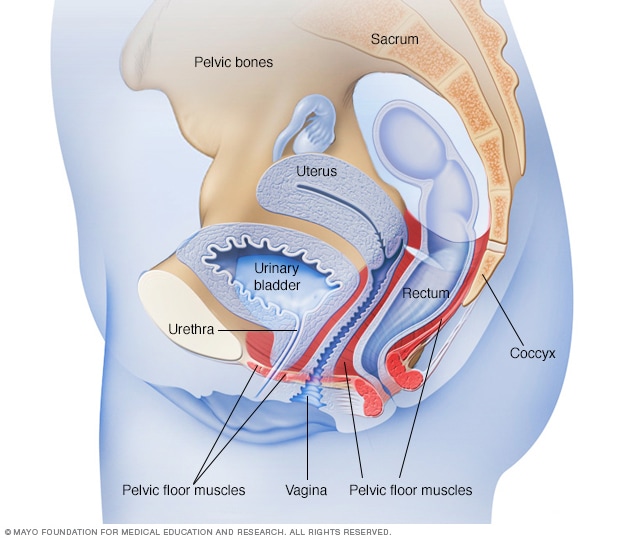What is pelvic health physiotherapy?
Pelvic health physiotherapy, also referred to as pelvic floor physiotherapy, is a specialized branch of physical therapy focused on promoting and restoring health of the pelvic region.
The Pelvic Floor: Basic Anatomy

Pelvic health physiotherapy centers around the pelvic floor muscles and associated structures.
These are the muscles between the hip bone and the sacrum (tail bone). They act like a hammock to support the pelvic organs – namely the bladder, rectum, and uterus.
These muscles play an important role in supporting key bodily functions, including urinary and bowel control, sexual function, and overall core stability.
A qualified pelvic health physiotherapist has a deep understanding of the complex anatomy of the pelvis and has the skills to assess and treat a wide range of pelvic health issues. These issues can affect individuals of all ages and genders, although they are most commonly associated with women, especially during pregnancy and postpartum stages.
What happens when the pelvic floor muscles aren’t working properly?
When these muscles are either too tight or too weak, this causes something called pelvic floor dysfunction, which can make functions of everyday life extremely difficult.
Some of the most common problems with the pelvic floor can lead to:
- Urinary problems such as painful or incomplete urination, stress incontinence or “leaking” during or after an activity or from coughing or sneezing, and urinary frequency and urgency
- Constipation, straining, or painful bowel movements
- Sexual dysfunction where sex is painful (dyspareunia)
- Vaginismus – where insertion of a tampon or medical device etc causes the muscles to spasm or contract, causing discomfort and sometimes pain
- Prolapse of the pelvic organs or feelings of “heaviness” or “bulging”
What causes pelvic floor dysfunction?
Weakening of the pelvic floor muscles is common after pregnancy and childbirth. If this is something you’re concerned about, getting assessed and working on strengthening the muscles can help achieve a strong, supportive pelvic floor before you give birth.
:max_bytes(150000):strip_icc()/GettyImages-1310443783-2000-3fe0eb1818e84997915c83fc14e58777.jpg)
Image: Getty
Other causes of pelvic floor dysfunction can include:
- Chronic coughing from conditions such as asthma or bronchitis
- Older age where the muscles become weaker as we age – a condition called sarcopenia that effects all muscles in the body
- Menopause where a drop in estrogen levels can result in feelings of heaviness/bulging, incontinence, increased urgency and frequency, and pelvic pain
- Obesity – due to more strain on the pelvic floor muscles
- Constipation and straining on the toilet
- Heavy lifting can put pressure on the pelvic floor muscles and lead to organ prolapse
- Undergoing abdominal or pelvic surgery
One rare condition that can also negatively affect the pelvic floor muscles is Pudendal Neuralgia. This is when a major nerve in the lower body becomes damaged or irritated. It can cause pain, discomfort, or numbness in the pelvic area and result in pelvic floor dysfunction. The nerve can get damaged from injury, surgery, childbirth, infection, or even spending lots of time on a bike.
Conditions Commonly Addressed by Pelvic Health Physiotherapy
1. Urinary Incontinence: One of the most prevalent issues treated by pelvic health physiotherapists is urinary incontinence, which can occur due to a weakened pelvic floor. Through targeted exercises and education, individuals can regain control over their bladder function.
2. Pelvic Pain: Chronic pelvic pain can be debilitating and is often caused by conditions such as endometriosis, interstitial cystitis, or muscle dysfunction. Pelvic health physiotherapy can help alleviate pain and improve quality of life.
3. Pregnancy and Postpartum Care: Women can experience a range of pelvic issues during pregnancy and after childbirth. Pelvic health physiotherapy can address problems like diastasis recti, pelvic girdle pain, and prepare women for childbirth and recovery.
4. Sexual Dysfunction: Pelvic health physiotherapy can help individuals struggling with sexual dysfunction, such as erectile dysfunction or painful intercourse. Therapists can work on muscle relaxation and strengthening techniques to improve sexual function.
5. Preventative Care: Pelvic health physiotherapy isn’t just for those with existing issues. It can also be valuable in preventing future problems by maintaining optimal pelvic health.
Benefits of pelvic floor physiotherapy
1. Non-Invasive: Pelvic health physiotherapy can be a non-invasive approach to addressing pelvic issues, which means it does not involve surgery or medication. It empowers individuals to take control of their health naturally.
2. Personalized Care: Each person’s pelvic health is unique, and a skilled pelvic health physiotherapist tailors treatment plans to individual needs. This personalized approach ensures the most effective care.
3. Improved Quality of Life: Many individuals suffering from pelvic issues experience a significant improvement in their quality of life after undergoing pelvic health physiotherapy. They regain confidence and comfort in daily activities.
4. Empowerment: Pelvic health physiotherapy empowers individuals with the knowledge and skills needed to manage their condition independently. This self-reliance fosters long-term wellness.
5. Preventative Approach: Even without specific issues, engaging in pelvic health physiotherapy can be preventative, maintaining pelvic muscle strength and function as we age.
ALY WALFORD, PHYSIOTHERAPIST
MScPT, BScRehabSc, IMS
A strong believer in teamwork and an active approach, Aly is excited to work with you to help you navigate through your injury, recovery, and return to activity/performance. Aly completed her Bachelor’s of Science and Master’s of Physical Therapy at McGill University. Since graduating, she has taken courses in manual therapy, biomedical dry needling (IMS), pelvic health (Treating & Training the Female Athlete), and ACL rehab to name a few. Aly is a certified Pelvic Health specialist and treats women 18yrs+.
A passionate runner and member of the Canadian National Ski Mountaineering Team, you can often find Aly out playing or training in the mountains year round.
“The pelvic floor is an important component of our “core”, however, it can be challenging since we are not able to visually see these muscles move when we exercise them. I enjoy working in women’s pelvic health to educate people, to help them find these muscles, and to help them connect them with the rest of the body. It has been amazing to see the direction of pelvic health evolve from way more than simply doing kegels!“



